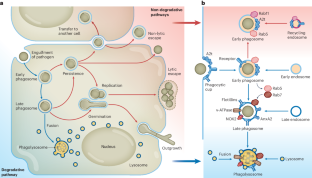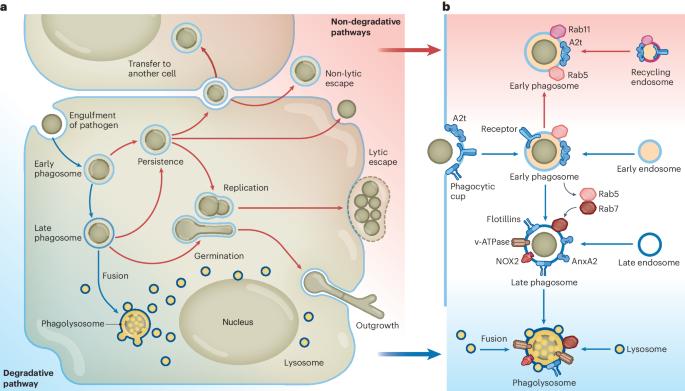Manipulation of host phagocytosis by fungal pathogens and therapeutic opportunities
IF 20.5
1区 生物学
Q1 MICROBIOLOGY
引用次数: 0
Abstract
An important host defence mechanism against pathogens is intracellular killing, which is achieved through phagocytosis, a cellular process for engulfing and neutralizing extracellular particles. Phagocytosis results in the formation of matured phagolysosomes, which are specialized compartments that provide a hostile environment and are considered the end point of the degradative pathway. However, all fungal pathogens studied to date have developed strategies to manipulate phagosomal function directly and also indirectly by redirecting phagosomes from the degradative pathway to a non-degradative pathway with the expulsion and even transfer of pathogens between cells. Here, using the major human fungal pathogens Aspergillus fumigatus, Candida albicans, Cryptococcus neoformans and Histoplasma capsulatum as examples, we discuss the processes involved in host phagosome–fungal pathogen interactions, with a focus on fungal evasion strategies. We also discuss recent approaches to targeting intraphagosomal pathogens, including the redirection of phagosomes towards degradative pathways for fungal pathogen eradication. In this Review, the authors discuss fungal pathogen–host interactions with a focus on phagocytosis and intracellular processing of pathogens within phagosomes. They also outline potential therapeutic approaches for targeting intraphagosomal pathogens.


真菌病原体对宿主吞噬功能的操纵和治疗机会。
宿主对病原体的一种重要防御机制是细胞内杀灭,它是通过吞噬作用实现的,吞噬作用是一种吞噬和中和细胞外颗粒的细胞过程。吞噬作用的结果是形成成熟的吞噬溶酶体,吞噬溶酶体是一种专门的隔室,可提供一种敌对的环境,被认为是降解途径的终点。然而,迄今为止研究的所有真菌病原体都开发出了直接操纵吞噬体功能的策略,也有通过将吞噬体从降解途径转向非降解途径来间接操纵吞噬体功能的策略,从而驱逐甚至在细胞间转移病原体。在此,我们以人类主要真菌病原体烟曲霉、白色念珠菌、新生隐球菌和荚膜组织胞浆菌为例,讨论宿主吞噬体与真菌病原体相互作用的过程,重点是真菌的逃避策略。我们还讨论了针对吞噬体内病原体的最新方法,包括将吞噬体转向降解途径以根除真菌病原体。
本文章由计算机程序翻译,如有差异,请以英文原文为准。
求助全文
约1分钟内获得全文
求助全文
来源期刊

Nature Microbiology
Immunology and Microbiology-Microbiology
CiteScore
44.40
自引率
1.10%
发文量
226
期刊介绍:
Nature Microbiology aims to cover a comprehensive range of topics related to microorganisms. This includes:
Evolution: The journal is interested in exploring the evolutionary aspects of microorganisms. This may include research on their genetic diversity, adaptation, and speciation over time.
Physiology and cell biology: Nature Microbiology seeks to understand the functions and characteristics of microorganisms at the cellular and physiological levels. This may involve studying their metabolism, growth patterns, and cellular processes.
Interactions: The journal focuses on the interactions microorganisms have with each other, as well as their interactions with hosts or the environment. This encompasses investigations into microbial communities, symbiotic relationships, and microbial responses to different environments.
Societal significance: Nature Microbiology recognizes the societal impact of microorganisms and welcomes studies that explore their practical applications. This may include research on microbial diseases, biotechnology, or environmental remediation.
In summary, Nature Microbiology is interested in research related to the evolution, physiology and cell biology of microorganisms, their interactions, and their societal relevance.
 求助内容:
求助内容: 应助结果提醒方式:
应助结果提醒方式:


